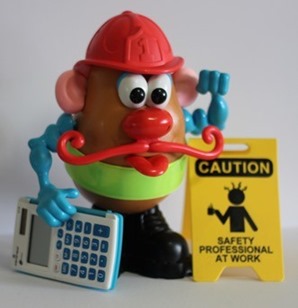Originally posted on February 9, 2021 @ 9:17 AM
What You Profess in Safety
 There is no separation between claiming the word ‘professional’ and what you profess. What one professes determines if one is profess-ional regardless of whether one likes to claim the word as a brand or not (https://safetyrisk.net/not-a-professions-bootlace/ ). Professions that understand an ethic of risk know that certain language, beliefs and behaviours exclude people from their profession. Sometimes required beliefs, values and language are captured in a professional standard or a code of ethics, but even then, adherence to a code doesn’t make one professional. Being professional extends well beyond compliance to a code, but incorporates a disposition that is difficult to quantify. Being professional is more about an implicit way of knowing than compliance to a code. There is a certain ‘spirit’ associated with being professional. You certainly know when people are NOT professional.
There is no separation between claiming the word ‘professional’ and what you profess. What one professes determines if one is profess-ional regardless of whether one likes to claim the word as a brand or not (https://safetyrisk.net/not-a-professions-bootlace/ ). Professions that understand an ethic of risk know that certain language, beliefs and behaviours exclude people from their profession. Sometimes required beliefs, values and language are captured in a professional standard or a code of ethics, but even then, adherence to a code doesn’t make one professional. Being professional extends well beyond compliance to a code, but incorporates a disposition that is difficult to quantify. Being professional is more about an implicit way of knowing than compliance to a code. There is a certain ‘spirit’ associated with being professional. You certainly know when people are NOT professional.
When we do a language audit in organisations we analyze the language used in risk and safety in an organization. It doesn’t take long in the diagnostic process to work out what the organization is professing about safety. It is easy to tell by what is said and NOT said in these sessions if safety is being undertaken professionally, and many times it is not. And this has little or no connection to the safety advisor or person in the safety position. When workers are in attendance, safety is most often acknowledged as an; ‘embuggerance’, ‘infantile’, ‘petty’ and ‘irrelevant’, ‘bogged down in paperwork’.
In a language audit we simply ask people to list the 10 most common words they associate with the practice of safety in their organization. The language that most often surfaces is about: legislation, regulation, prevention, injury, hazards, controls and all focused on objects. Having conducted such audits for many years it is reliable that the language of ‘care’, ‘helping’, ‘person’ and ‘learning’ never comes to the surface. When people think of safety and the professing of safety, they rarely think of helping, care, persons or learning. If one looks at the WHS curriculum or the AIHS Body of Knowledge this is also clear; care, helping, personhood and learning are not the language professed.
When one looks broadly at the safety industry one finds the common language professed, is about: ‘safety is a choice you make’, ‘zero harm’, ‘heroes’ and ‘all accidents are preventable’. When you guiding mantra defines safety by a number, the only consistent outcome will be about objects, metrics, controls and brutalism. Zero ideology has been professed by safety globally since 2017. You won’t find such language in any profession, you will find the language of ‘care’, ‘helping’, ‘persons’ and ‘learning’.
I had a discussion this morning with a safety person in the USA who, after doing the Introduction to SPoR, tried to get the words ‘care’, ‘helping’, ‘person’ and ‘learning’ into their organization’s so called ‘Vision Statement’. No chance, everyone resisted it because they don’t associate the practice of safety with care, helping, persons and learning. This is why safety is NOT a profession.
Why not do an audit of your organisation’s language about risk and see what you find. Get out the: policy documents, look at the safety notice board, posters, register of toolbox talks, SWMS, or conduct a language audit and see what is being professed. What do you find?



Do you have any thoughts? Please share them below